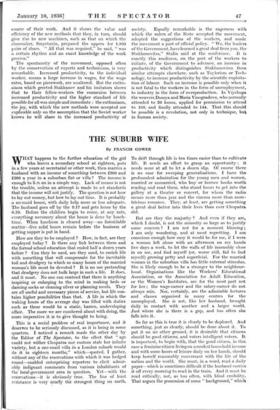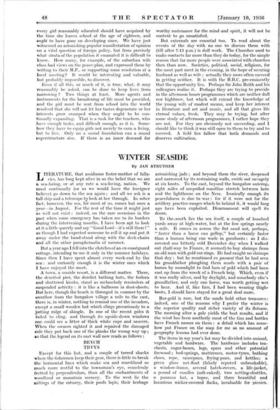THE SUBURB WIFE
By FRANCIS GOWER
WHAT happens to the further education of the girl who leaves a secondary school at eighteen, puts in a few years at secretarial or other work, then marries a husband with an income of something between £800 and £500 a year in a suburban flat or villa ? The income is enough to Ii.'s, on in a simple way. Lack of means is not the trouble, unless an attempt is made to set standards that the income will not justify. The question is not how to lay out money, but how to lay out time. It is probably a no-maid house, with daily help more or less adequate. The husband goes off by the 9.17 and gets home by the 6.59. Before the children begin to come, at any rate, everything necessary about the house is done by lunch- time.. When luncheon is cleared away—no formidable matter—five solid hours remain before the business of getting supper is put in hand.
How are they tome employed ? How, in fact, are they employed today ? Is there any link between them and the formal school education that ended half a dozen years before ? Can they be used, are • they used, to enrich life with something that will compensate for the inevitable toil and drudgery to which so many hours of the married woman's life must be devoted ? It is no use pretending that drudgery does not bulk large in such a life. It does, and it must. No one can contend that there is anything inspiring or enlarging to the mind in making beds or darning socks: or cleaning silver or planning meals, They are all useful and necessary pieces of service, but life con- tains higher possibilities than that. A life in which the waking hours of the average day was filled with duties such as these would be a static, barren, undeveloping affair. The more we are cumbered about with doing, the more imperative it is to give thought to being.
This is a social problem of real importance, and it deserves to be seriously discussed, as it is being in some quarters. I noticed a remark made the other day by the Editor of The Spectator, to the effect that " age could not wither Cleopatra nor custom stale her infinite variety, but a one-maid villa in a London suburb would do it in eighteen months," which—quoted, I gather, without any of the reservations with which it was hedged round=enabled enterprising reporters to elicit admir- ably indignant comments from various inhabitants of the local-government area in question. Yet—with the reservations—it is obviously true. The line of least resistance is-very- nearly the strongest thing on earth. To drift through life is ten times easier than to cultivate life. It needs an effort to grasp an opportunity ; it needs none at all to let a dozen slip. Of course there is no case for sweeping generalisations. I have the profoundest admiration for the young men and women, married or unmarried, who buy or borrow books worth reading and read them, who stand hours to get into the gallery at a theatre or concert, for whom the radio means more than jazz and the cinema more than mere- tricious romance. They, at least, are getting something a great deal better into their lives than ever Cleopatra did.
But are they the majority ? And even if they are, which I doubt, is not the minority so large as to justify some concern ? I am not for a moment blaming ; I am only wondering, and at most regretting. I am conscious• enough how easy it would be for me, if I were a woman left alone with an afternoon on my hands five days a week, to let the walls of life insensibly close in on me, and find myself (or, worse still, fail to find myself) growing petty and superficial. For the married woman in the suburban villa has little external stimulus. She is likely enough to be a stranger to the neighbour- hood. Organisations like the Workers' Educational Association, or the Association for Adult Education, or the Women's Institutes, are for the most part not for her ; the wage-earner and the salary-earner do not always mix. Nor, certainly, are the admirable lectures and classes organised in many centres for the unemployed. She is not, like her husband, brought daily in contact with another and a larger world. Just where she is there is a gap, and too often she falls into it.
So far as this is true it is clearly to be deplored. And something, just as clearly, should be done about it. To put it on no other ground, it is desirable that citizens should be good citizens, and voters intelligent voters. It is important, to begin with, that the good citizen, in this case a feminine citizen living on a modest household income and with some hours of leisure daily on her hands, should keep herself reasonably conversant with the life of the nation and the world. She must, in a word, read a daily paper—which is sometimes difficult if the husband carries it off every morning to read in the train. And it must be read critically, not, as too often, with blind credulity. That argues the possession of some " background," which -every girl reasonably educated should have acquired by the time she leaves school at the age of eighteen, and ought to have gone on developing since. We have just witnessed an astonishing popular manifestation of opinion on a vital question of foreign policy, but from precisely what strata of the population it emanated it is difficult to know. How many, for example, of the suburban wife class had views on the peace-plan, and expressed them by writing to their M.P., or supporting some resolution at a local meeting? It would be interesting and valuable, but probably impossible, to discover.
Even if all this, or much of it, is true, what, it may reasonably be asked, can be done to keep lives from narrowing ? Two things at least. More agents and instruments for the broadening of life must be provided, and the girl must be sent from school into the world resolved that she will not let her tastes degenerate or her -interests grow cramped when they ought to be con- tinually expanding. That is a task for the teachers, who have enough tasks, and difficult enough, as it is. Some- how they have to equip girls not merely to earn a living, but to live. Only on a sound foundation can a sound superstructure rise. If there is an inner demand for worthy sustenance for the mind and spirit, it will not be -content to go unsatisfied.
But externals are essential too. To read • about the events of the day with no one to discuss them with (till after 7.15 p.m.) is dull work. The Churches used to -make contacts far more than they do today, for the simple reason that far more people were associated with churches then than now. Societies, political, social, religious, for the most part meet in the evening, in the hope of securing husband as well as wife ; actually they more often succeed in getting neither. It is with the B.B.C. pre-eminently that the opportunity lies. Perhaps Sir John Reith and his colleagues realise it. Perhaps they are trying to provide in the afternoon hours programmes which are neither dull nor highbrow, but which will extend the knowledge of the young wife of modest means, and keep her interest in literature and art and music, and all that gives life eternal values, fresh. They may be trying, but after some study of afternoon programmes, I rather hope they are not. For they are obviously not succeeding, and I should like to think it was still open to them to try and to succeed. A field lies fallow that both demands and deserves cultivation.











































 Previous page
Previous page